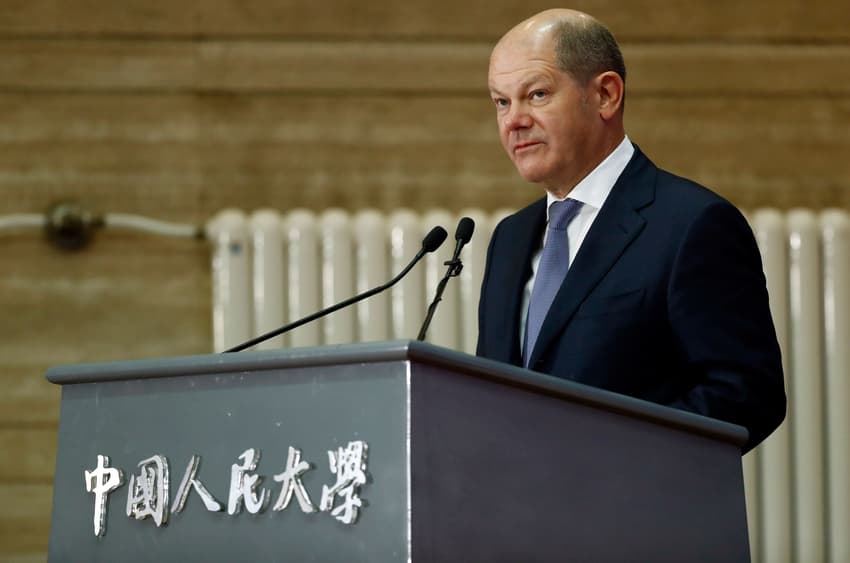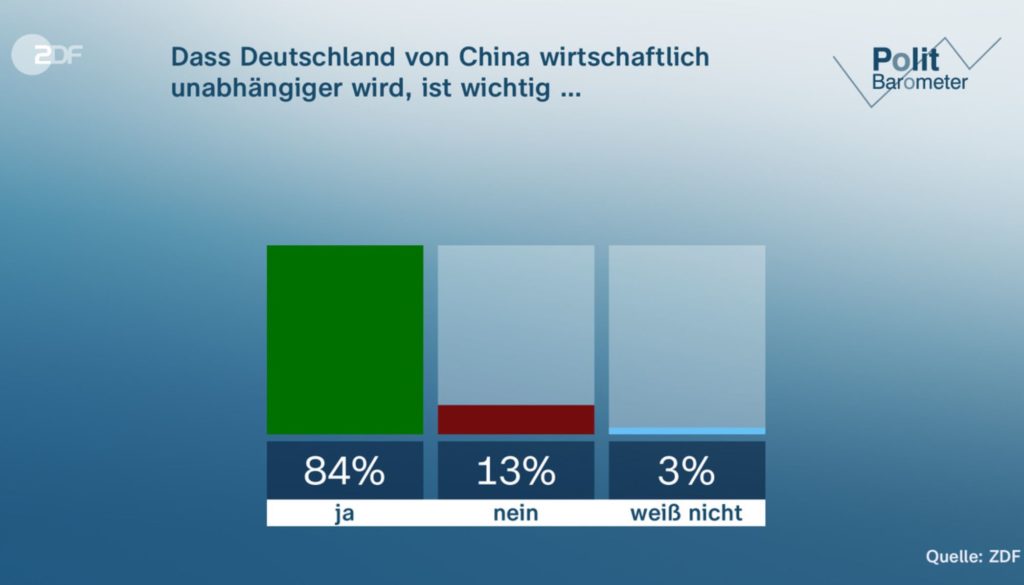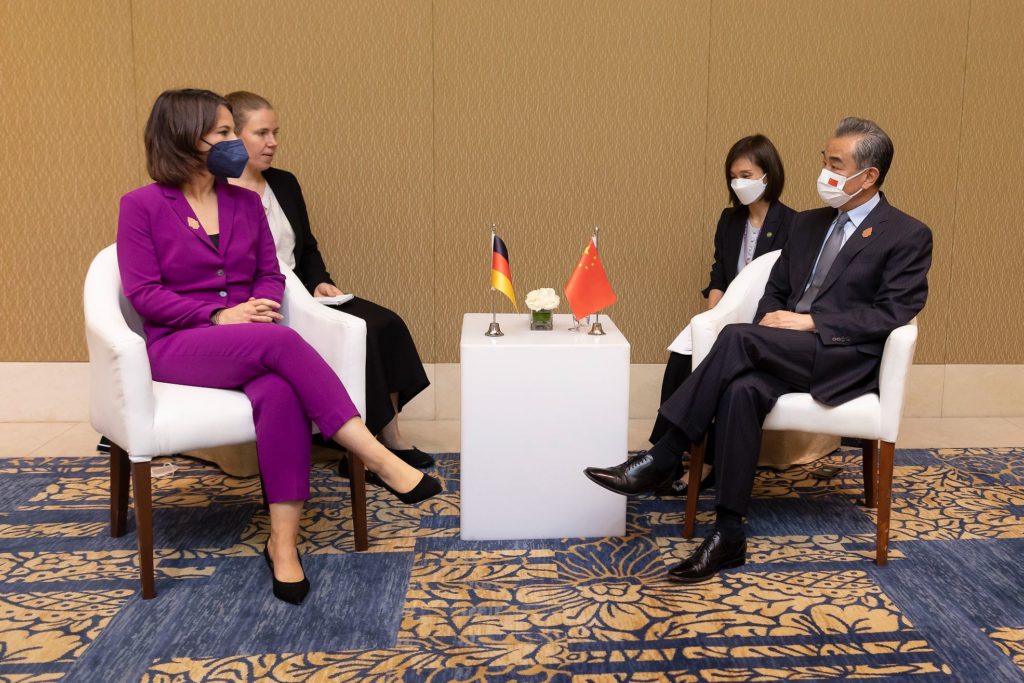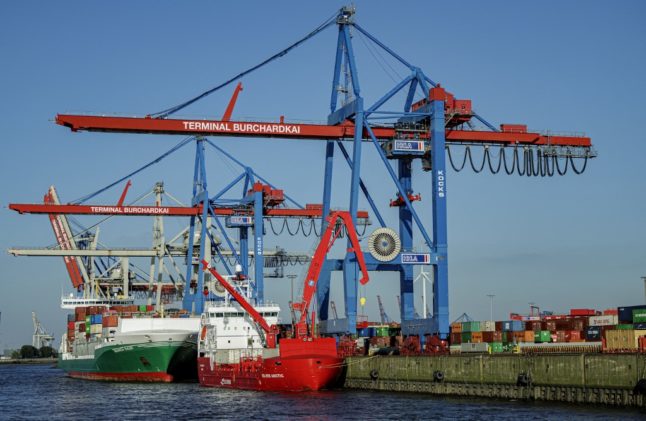EXPLAINED: Why is Olaf Scholz's stance on China so controversial in Germany?

The German Chancellor has allowed a Chinese state-owned company to acquire a stake in the Port of Hamburg, against all expert advice - just as the German public wants to become more independent of China. There are fears that Germany could repeat the mistakes it made with Russia.
In early November, Olaf Scholz will be the first G7 leader to visit China since the beginning of the Covid-19 pandemic.
It comes right after a Communist Party Congress that saw President Xi Jinping stack the Chinese Politburo with his allies, forcibly remove his immediate predecessor, and amend the party Charter to oppose Taiwanese independence.
Scholz's position on expanding business ties with China has led to major rows in his coalition government as warnings grow of allowing foreign powers to gain hold of critical infrastructure and repeating the mistakes that happened with Russia.
OPINION: Germany has failed to do its energy 'homework' and now faces years of catching up
Foreign policy experts say more politicians - and even regular Germans - are waking up to the threat that over-reliance on China poses, but the Scholz Chancellery is choosing to ignore the warnings.
“Scholz isn’t sleepwalking into a China dependency. His eyes are wide open, says Jessica Berlin, Visiting Fellow at the German Marshall Fund of the United States.
"He knows his own government is against this but nevertheless is choosing to continue the mistaken policies of the previous government, where he served as both Vice Chancellor and Finance Minister."
Public wants to reduce economic links with China
At the time of Russia’s invasion of Ukraine, Germany was getting over half its gas from Moscow. Becoming independent of Vladimir Putin’s Russia has resulted in a massive dent in the economy as well as the average person in Germany having to pay higher electricity, heating, and grocery bills.
But the public isn’t backing down. Around three-quarters of people in Germany have said they are willing to pay higher prices if it helps Ukraine. Wary of replacing its dependence on one dictatorship by becoming reliant on another, a staggering estimated 84 percent of people in Germany want the country to reduce economic links with China, according to a recent poll by broadcaster ZDF.

An October 2022 poll for German public broadcaster ZDF asks if respondents agree that becoming more independent of China is important. Source: ZDF
Yet the Chancellor seems keen to arrive in Beijing with as many hands held out as possible for Chinese cash. Scholz is bringing CEOs of large German companies like Siemens and Volkswagen with him. Volkswagen is particularly exposed, now relying on China for over 40 percent of all its sales. The company even operates a factory in the heart of Xinjiang, where the Chinese Muslim minority, the Uyghurs, are regularly detained in forced labour camps, tortured, and even subjected to forced sterilisation.
Foreign Minister Annalena Baerbock of the Greens, coalition partner to Scholz’s Social Democrats (SPD), recently told the Süddeutsche Zeitung newspaper that it’s risky for major German companies to be so dependent on a single market with authoritarian rulers – especially given the possibility that history may repeat itself.
“Complete economic dependence based on hope leaves us open to political blackmail,” she told the newspaper. “The task of a responsible economy – and even more so of politics – is to not allow us to get back into a situation where we have to save the chemical and auto companies with billions in tax money, because they made themselves dependent on the Chinese market.”

German Foreign Minister Annalena Baerbock meets with her Chinese counterpart at a G20 meeting in Indonesia. Baerbock's Greens advocate economically disentangling Germany from China. Photo: picture alliance/dpa/photothek.net | Thomas Imo
Controversy over Hamburg
Scholz also appears keen to bring in Chinese money closer to home, by allowing Chinese state-owned shipping giant Cosco to acquire a stake in the Port of Hamburg - against advice from his own advisors, several ministries, Germany’s allies, his coalition partners, and the European Commission.
“The Chinese Communist Party must not have access to our country’s critical infrastructure,” General Secretary of the liberal FDP Bijan Djir-Sarai, whose party governs with Scholz, told the German DPA press agency.
READ ALSO: German Chancellor under fire over alleged support for China project
As a compromise to smooth the tensions in the government, Germany will only allow Cosco to acquire a 24.9 percent stake in Hamburg’s port, unlike the 35 percent that was originally planned.
The government officially approved the investment on Wednesday morning. A total of six German ministries, including the economy, defence and foreign offices, wanted to veto the Cosco deal, while former Hamburg mayor Scholz supported the sale.
A source told AFP that reducing the stake, would "prevent a strategic participation and reduce it to a purely financial participation".
"Of course, this does not solve the actual concerns," the source said, adding that the six ministries would still have preferred an outright ban.

Container ships are discharged at Hamburg Port terminals. The EU is said to have warned Germany months ago about backing China's investment in the port. (Photo by Axel Heimken / AFP)
On Tuesday, German President Frank-Walter Steinmeier joined in with the warnings against Germany becoming too dependent on China. "For the future, it means we have to learn lessons, and learning the lesson means we have to reduce unilateral dependencies wherever possible, and that applies especially to China," Steinmeier told broadcaster ARD.
But the problem goes deeper than business links, with the chief of the German BND intelligence service saying last week that some sections of German society still have a certain “naivety” where China is concerned, especially in areas of scientific collaboration – where Chinese companies, backed by state money, have been known to steal trade and technological secrets from their western partners.
Germany “must be prepared for the fact that economic levers could be used to enforce Chinese ideas,” BND Chief Bruno Kahl told an annual meeting of German secret service. “Should there be differences in political views between Germany and China, these means will be used.”
Foreign policy expert Jessica Berlin told The Local that German dependence on Chinese buyers and low production costs go back decades, and that old habits are hard to break.
Olaf Scholz should not go to China.
Doing so will be seen by CCP as @Bundeskanzler coming to kiss Xi’s proverbial ring, just as Xi further consolidates power & increases brutal domestic crackdowns & aggressive posture toward Taiwan.
Not smart. Don’t go.https://t.co/fusXyTwQRG
— Jessica Berlin (@berlin_bridge) October 16, 2022
"The Chancellery is the part of German government that’s most resistant to change. This is something that will increasingly cause tensions in the governing coalition and in German society more widely,” said Benjamin Tallis, Research Fellow and the German Council on Foreign Relations.
"The Chancellery might have their heads in the sand when it comes to Chinese dependence, but I’m not sure anyone else does anymore. That’s actually encouraging, because it shows the level of fight and debate that’s going on."
However, with China a top trading partner for Germany, Scholz is keen to stand his ground.
"We do not have to decouple ourselves from some countries, we must continue doing business with individual countries - and I will say explicitly, also with China," Scholz recently said.
With reporting from AFP
Comments (1)
See Also
In early November, Olaf Scholz will be the first G7 leader to visit China since the beginning of the Covid-19 pandemic.
It comes right after a Communist Party Congress that saw President Xi Jinping stack the Chinese Politburo with his allies, forcibly remove his immediate predecessor, and amend the party Charter to oppose Taiwanese independence.
Scholz's position on expanding business ties with China has led to major rows in his coalition government as warnings grow of allowing foreign powers to gain hold of critical infrastructure and repeating the mistakes that happened with Russia.
OPINION: Germany has failed to do its energy 'homework' and now faces years of catching up
Foreign policy experts say more politicians - and even regular Germans - are waking up to the threat that over-reliance on China poses, but the Scholz Chancellery is choosing to ignore the warnings.
“Scholz isn’t sleepwalking into a China dependency. His eyes are wide open, says Jessica Berlin, Visiting Fellow at the German Marshall Fund of the United States.
"He knows his own government is against this but nevertheless is choosing to continue the mistaken policies of the previous government, where he served as both Vice Chancellor and Finance Minister."
Public wants to reduce economic links with China
At the time of Russia’s invasion of Ukraine, Germany was getting over half its gas from Moscow. Becoming independent of Vladimir Putin’s Russia has resulted in a massive dent in the economy as well as the average person in Germany having to pay higher electricity, heating, and grocery bills.
But the public isn’t backing down. Around three-quarters of people in Germany have said they are willing to pay higher prices if it helps Ukraine. Wary of replacing its dependence on one dictatorship by becoming reliant on another, a staggering estimated 84 percent of people in Germany want the country to reduce economic links with China, according to a recent poll by broadcaster ZDF.

Yet the Chancellor seems keen to arrive in Beijing with as many hands held out as possible for Chinese cash. Scholz is bringing CEOs of large German companies like Siemens and Volkswagen with him. Volkswagen is particularly exposed, now relying on China for over 40 percent of all its sales. The company even operates a factory in the heart of Xinjiang, where the Chinese Muslim minority, the Uyghurs, are regularly detained in forced labour camps, tortured, and even subjected to forced sterilisation.
Foreign Minister Annalena Baerbock of the Greens, coalition partner to Scholz’s Social Democrats (SPD), recently told the Süddeutsche Zeitung newspaper that it’s risky for major German companies to be so dependent on a single market with authoritarian rulers – especially given the possibility that history may repeat itself.
“Complete economic dependence based on hope leaves us open to political blackmail,” she told the newspaper. “The task of a responsible economy – and even more so of politics – is to not allow us to get back into a situation where we have to save the chemical and auto companies with billions in tax money, because they made themselves dependent on the Chinese market.”

Controversy over Hamburg
Scholz also appears keen to bring in Chinese money closer to home, by allowing Chinese state-owned shipping giant Cosco to acquire a stake in the Port of Hamburg - against advice from his own advisors, several ministries, Germany’s allies, his coalition partners, and the European Commission.
“The Chinese Communist Party must not have access to our country’s critical infrastructure,” General Secretary of the liberal FDP Bijan Djir-Sarai, whose party governs with Scholz, told the German DPA press agency.
READ ALSO: German Chancellor under fire over alleged support for China project
As a compromise to smooth the tensions in the government, Germany will only allow Cosco to acquire a 24.9 percent stake in Hamburg’s port, unlike the 35 percent that was originally planned.
The government officially approved the investment on Wednesday morning. A total of six German ministries, including the economy, defence and foreign offices, wanted to veto the Cosco deal, while former Hamburg mayor Scholz supported the sale.
A source told AFP that reducing the stake, would "prevent a strategic participation and reduce it to a purely financial participation".
"Of course, this does not solve the actual concerns," the source said, adding that the six ministries would still have preferred an outright ban.

On Tuesday, German President Frank-Walter Steinmeier joined in with the warnings against Germany becoming too dependent on China. "For the future, it means we have to learn lessons, and learning the lesson means we have to reduce unilateral dependencies wherever possible, and that applies especially to China," Steinmeier told broadcaster ARD.
But the problem goes deeper than business links, with the chief of the German BND intelligence service saying last week that some sections of German society still have a certain “naivety” where China is concerned, especially in areas of scientific collaboration – where Chinese companies, backed by state money, have been known to steal trade and technological secrets from their western partners.
Germany “must be prepared for the fact that economic levers could be used to enforce Chinese ideas,” BND Chief Bruno Kahl told an annual meeting of German secret service. “Should there be differences in political views between Germany and China, these means will be used.”
Foreign policy expert Jessica Berlin told The Local that German dependence on Chinese buyers and low production costs go back decades, and that old habits are hard to break.
Olaf Scholz should not go to China.
— Jessica Berlin (@berlin_bridge) October 16, 2022
Doing so will be seen by CCP as @Bundeskanzler coming to kiss Xi’s proverbial ring, just as Xi further consolidates power & increases brutal domestic crackdowns & aggressive posture toward Taiwan.
Not smart. Don’t go.https://t.co/fusXyTwQRG
"The Chancellery is the part of German government that’s most resistant to change. This is something that will increasingly cause tensions in the governing coalition and in German society more widely,” said Benjamin Tallis, Research Fellow and the German Council on Foreign Relations.
"The Chancellery might have their heads in the sand when it comes to Chinese dependence, but I’m not sure anyone else does anymore. That’s actually encouraging, because it shows the level of fight and debate that’s going on."
However, with China a top trading partner for Germany, Scholz is keen to stand his ground.
"We do not have to decouple ourselves from some countries, we must continue doing business with individual countries - and I will say explicitly, also with China," Scholz recently said.
With reporting from AFP
Join the conversation in our comments section below. Share your own views and experience and if you have a question or suggestion for our journalists then email us at [email protected].
Please keep comments civil, constructive and on topic – and make sure to read our terms of use before getting involved.
Please log in here to leave a comment.